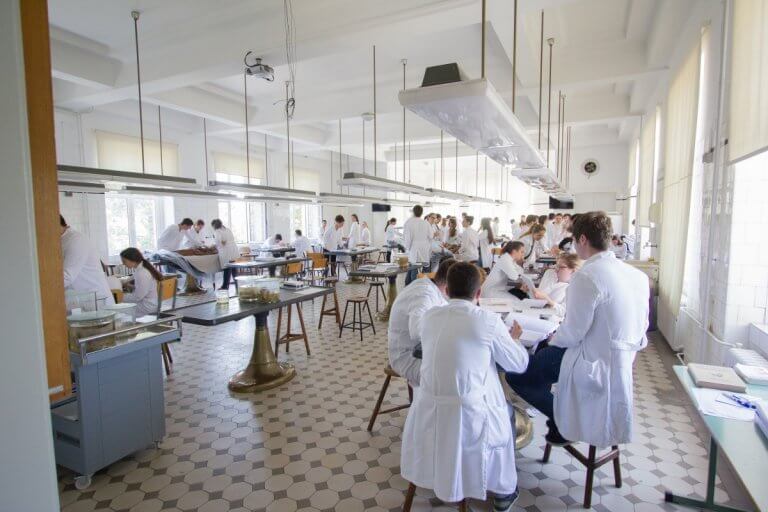
Healthcare is at a crossroads of unprecedented challenge and exponential opportunity. The world’s population is projected to hit nine billion by 2050, according to the United Nations. At the same time, our societies are aging and disease patterns are changing.
In less than 30 years from now, the EU’s population is projected to peak, reaching 529 million – this means an increase of another 18.8 million people from 2016. However, its societies are expected to go from 3.3 working people for every person aged over 65 years, to only two working-age people. And with climate change and the increased mobility of people and goods, the continent faces the possibility of exposure to new, emerging and re-emerging diseases.
But for all these complications, the state of our healthcare today has never been in a more able position to find potential solutions. Digital technology has shown remarkable value for health; diagnosing disease, monitoring the impact of policies on population health, and most recently, making a cure for HIV possible. Such progress is the driving force behind the world’s ambitious Sustainable Development Goals (SDGs), which contain one aim for health and over 50 health-related targets, seeking to save some 29 million lives by 2023.

University of Zagreb
To achieve this, however, we would need a large pool of well-trained health workers. The global economy is projected to create around 40 million new health sector jobs by 2030, mostly in middle- and high-income countries, the World Health Organization (WHO) estimates. In England alone, it’s anticipated that 190,000 more NHS staff will be needed by 2027 if the current pressure on services continues.
With such demand, there’s never been a more promising area for students today than medicine. For a high-quality, high-value medical degree recognised worldwide, head to the University of Zagreb’s School of Medicine.
Its six-year Medical Studies in English (MSE) Programme is conducted entirely in English, meeting both American (USMLE) and EU standards. As the Republic of Croatia’s oldest, most respected and largest medical school, it has a long tradition of educating foreign students into fully competent medical professionals within the global environment.
A degree from here translates to automatic recognition of professional qualifications for students from the EU and UK. It’s also recognised by the Government of Canada, and Canadian citizens are eligible to apply for government (OSAP) student funding. The programme is recognised by the European Consortium of Accreditation and awarded with a CEQUINT Certificate.
Its MSE programme is no doubt vigorous. To be admitted, candidates must have passed recognised international exams such as the MCAT, SAT or BMAT, or sit for an admission test held in Zagreb, Israel, Sweden or Germany.
Accepting only 50 students per academic year, the curriculum requires more than 5,500 hours of teaching, 360 ECTS (European Credit Transfer System) and 10 to 15 percent of academic study from electives, which include subjects like Pharmacogenomics, Basics of Paediatric Allergy and Clinical Nutrition. There are joint electives with established medical schools abroad such as the UK’s University of Kent and Imperial College London, Canada’s McGill University and Spain’s University of Pompeu Fabra, Barcelona.

University of Zagreb
The school adopts contemporary, innovative methodological approaches in its pedagogy, using problem‐based learning (PBL) and teaching in small groups. In their clinical years, students will have the option of staying in institutions or hospitals in the Republic of Croatia or go abroad to the countries they plan to work in post-graduation. This is where they can leverage on the university’s extensive list of international education partners, which includes names such as the Medical College of Wisconsin, King’s College London and the University of Toronto.
Since the MSE programme began in 2003, 224 students from 28 countries have graduated, mostly from Canada, France, United States of America, Sweden, Germany and Israel. It’s not hard to understand why it’s a popular option in the global community of medical aspirants. The aforementioned academic accolades, as well as the good starting positions its alumni have landed, depict a truly elite medical school.
But that’s not all. As Croatia’s capital and a location in central Europe, this is a study abroad destination that has it all; from atmosphere to history, food to safety. A little bit more than an ‘s drive from the Adriatic coast, it’s a great base for students looking for adventure and travelling between their studies.
So, if you’re an aspiring doctor in search of a world-class, internationally-recognised degree, the University of Zagreb’s School of Medicine offers an unforgettable study abroad experience and a launchpad to a successful medical career.
Follow the University of Zagreb’s School of Medicine on Facebook, Instagram and LinkedIn
Liked this? Then you’ll love…
5 best universities in the world for Life Sciences and Medicine
Leading European universities for future medical professionals







